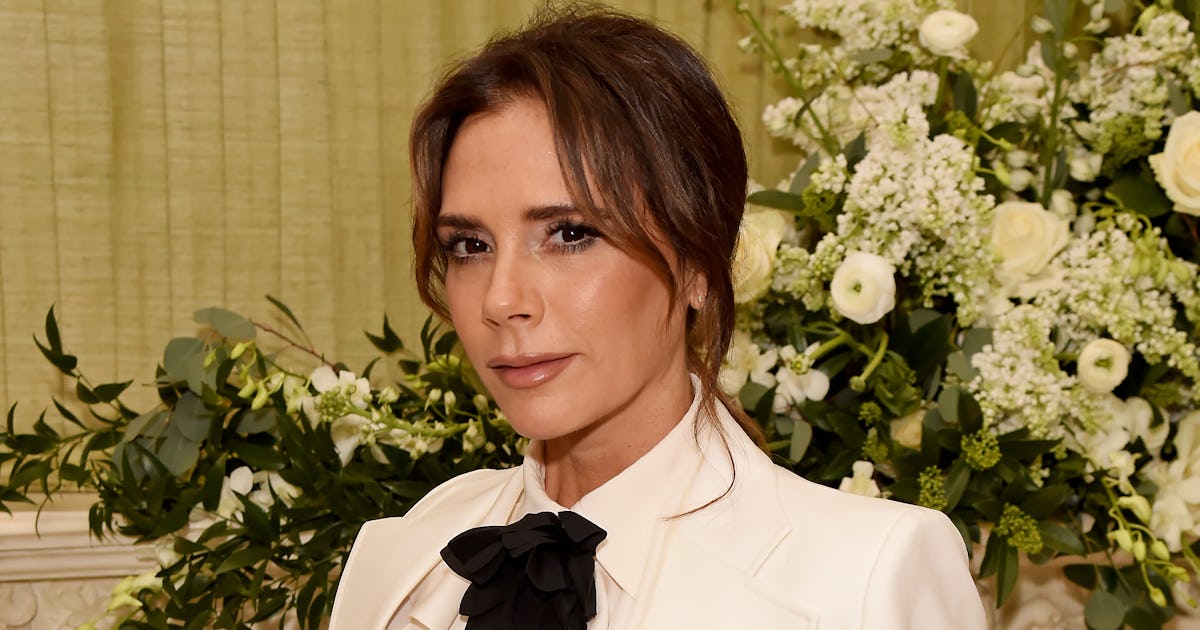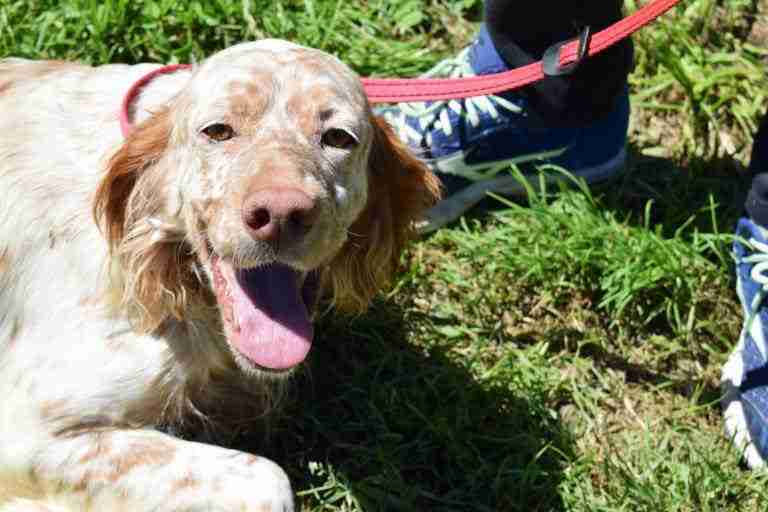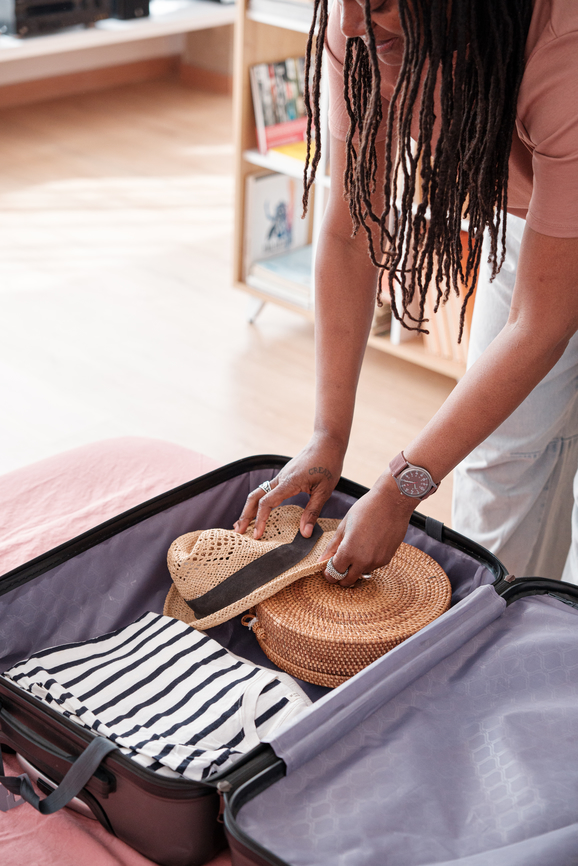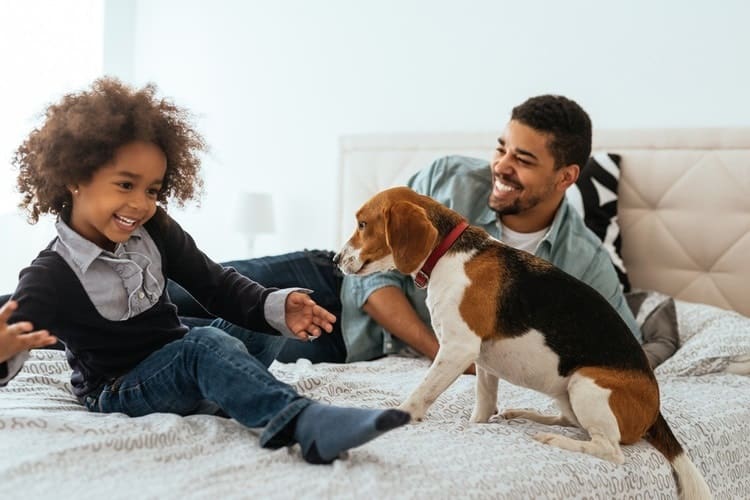
Are you thinking about expanding your family with a four-legged friend? If you have kids, it’s essential to select a dog breed that’s well-known for getting along with children. After all, each member of your family—both small and tall—should feel comfortable around your dog, and vice versa. You shouldn’t need to worry about your children when they play fetch with your dog or help you prepare their daily meal.
However, it can be difficult to know which dog breed is best for your family if you have kids in tow. If you select a breed that’s not well-matched with your family’s needs, problems are bound to ensue. For example, your children and dog may find it hard to connect with one another. Breeds that tend to be patient and playful are often well-suited for families with young kids, although your lifestyle plays an important role, too. For instance, breeds that are high-energy and require a great deal of exercise may not be the best choice for families living in apartments in the big city, where outdoor space for running and playing isn’t readily available.
There are many considerations to weigh when choosing the best dog breed for kids. To help you determine the best dog breed for your family’s needs, we reached out to a panel of veterinarians, breeders, pet professionals, and pet bloggers and asked them to answer this question:
“What’s the single best dog breed for kids (and why is it the best choice)?”
Meet Our Panel of Vets, Breeders, & Pet Professionals:
Keep reading to learn more about what our experts had to say about the best dog breeds for kids (small and large).
 Debi McKee
Debi McKee
Debi McKee is a foster dog mom, plus the mom of two resident dogs and three kids. She is a huge advocate for rescue dogs, volunteering for her local dog rescue and humane society. As the creator of Rescue Dogs 101, she guides people in their journey of adopting and raising a rescue dog every step of the way.
“It’s more important to look at the individual dog’s personality and energy level instead of the breed…”
Almost any dog breed can be great with kids. Finding a family dog that is calm and patient is the priority, no matter the breed of the dog.
 Ben Team
Ben Team
Ben is the senior content editor for K9 of Mine and has spent most of his adult life working as a wildlife educator and animal-care professional. Ben’s had the chance to work with hundreds of different species, but his favorite animals have always been dogs.
“It is difficult to select a single breed that is ideal for all kids, given the way children (and their families) differ…”
A particularly sensitive child may need an extremely gentle breed, such as a Cavalier King Charles Spaniel, while a big and busy family with several kids may be better suited for a high-energy, ready-to-rock dog, like a beagle. I can even envision situations in which one of the relatively gentle working breeds, such as the Doberman Pinscher, may be a great choice.
But, if you forced me to select a single breed that would work well with most kids, it would be hard to argue with a Golden Retriever.
Golden Retrievers have all of the traits you want in a dog for a child: They’re intelligent, friendly, sweet, gentle, and playful. They’re also relatively easy to train, and they bond quickly with their owners.
These dogs may shed pretty heavily, and they also require a lot of exercise, but if these aren’t deal-breakers, a Golden Retriever may be the perfect choice for a family.
I’d give an honorable mention to Labrador Retrievers, who are quite similar (if a little more rambunctious) to Golden Retrievers.
 Sara Redding Ochoa, DVM
Sara Redding Ochoa, DVM
Sara Redding Ochoa, DVM graduated from St. George’s University with a Doctorate of Veterinary Medicine in 2015. Since veterinary school, she has been working at a small animal and exotic veterinary clinic in east Texas, where she has experience treating a wide range of different animals. She currently sits on the advisory board for DogLab.com.
“Labs are one of the best dogs for kids…”
They usually have enough energy to keep up with the active kids in the house and usually do not have many health problems. They are also big enough that they will not get hurt easily if someone accidentally steps on them.
 Jim Carlson
Jim Carlson
Jim Carlson, DVM CVA CVTP is the owner and holistic veterinarian at Riverside Animal Clinic & Holistic Center, located in McHenry, IL.
“The affable Golden Retriever is my absolute favorite family dog…”
After owning two of them while raising my family, I would vote for this breed any day of the week. You can’t compare the combination of sweetness, activity level, and genuine loyalty to another breed, and those qualities make Goldens a top family pick.
Labrador Retrievers also make great family pets and are a close second to Golden Retrievers for family-friendly choices.
 Li-ran Bukovza
Li-ran Bukovza
Li-ran is the founder of PuppyTip, a dog advice website designed to inspire and educate curious dog owners.
“The best dog breed for kids of all ages is arguably the Beagle…”
These smaller size dogs certainly don’t lack for personality or cuteness, and they absolutely thrive on spending company with the humans they love. Additionally, their high energy level means that they can keep up with your kids’ constant running and playing.
While it’s true that Beagles can be a little loud at times and are also prone to wandering if not properly supervised, having children around provides them with the companionship they need to stick close to home.
Beagles were originally bred to be small game hunters, yet they’re anything but aggressive. Their energetic, carefree personality makes them a great playmate for small children. Ample opportunity to run and play is absolutely essential with this breed, so you don’t have to worry about your kids wearing them out. In fact, the contrary might occur!
Beagles tend to be about 20 pounds maximum and about a foot tall. This compact size means that they’re a perfect companion to children, and there’s less chance of them accidentally knocking your kids over or inadvertently hurting them in the midst of an intense play session.
 Lisa Theriault
Lisa Theriault
Lisa Theriault is the Founder of Your Dog’s Health Matters, a website dedicated to well-researched health care information on dogs.
“The best dog breed for kids would be the Portuguese Water Dog…”
The Portuguese Water Dog is kind, patient, loyal, obedient, and extremely intelligent. Portuguese Water Dogs have soft, loopy curls and are bred to be non-shedding. This dog is perfect for anybody with allergies.
They love to go for hikes, run alongside bicycles, watch over children as they play, and can handle a fair bit of touching and poking from small children and babies or toddlers. President Obama had a Portuguese Water Dog for his family.
Males and females average at about the same weight and height, with the male being slightly larger. These dogs grow to be upwards of 50 pounds and have long legs. Although reasonably large, these dogs are very easy to handle. They respond well on a leash and quickly learn commands.
These dogs fare best with people who’ve had some experience with dogs, but it’s not a deal-breaker. There are countless dog behavior and training programs available that the whole family can participate in.
At the end of the day, this is the dog that will keep an eye on your little one, following him/her around the house happily sharing toys, and putting up with a little hair pulling now and then. If your baby cares to toss a little food from the high chair now and then, you will have a very loyal breed for life because they love to be treated.
 Erin Scott
Erin Scott
Erin Scott is the Editor of SparkPaws.
“Golden Retrievers are characterized as loyal, reliable, kind, and friendly…”
They are known as one of the best family dog breeds. They’re quick learners that require lots of physical activity which can be good for your kids. They are very sweet and gentle with young children and do not bark much. But because Golden Retrievers are boisterous big dogs, they can accidentally knock over a small child. Other than that, there is no doubt they are one of the best.
 Zach David
Zach David
Zach is the Chief Editor of Beyond the Treat. He is a life-long pet owner and enthusiast. He was born into a family with a dog named Murphy, and since then has owned several other dogs, mice, ferrets, fish, geckos, salamanders, tarantulas, and a cat.
“In picking the best dog breed for kids, I would have to go with the Golden Retriever…”
While this may seem like a cliché answer that many people will give, it’s a cliché for a reason. Golden Retrievers are frequently defined as one of the best family dogs out there due to their intelligence, capacity for love, and ability to adapt to the lifestyle of their family.
As a kid, I was constantly around Golden Retrievers of all ages, sizes, and mannerisms. I can’t recall a single one that was unpleasant to me or my young friends and siblings. Children can act in ways that may not be the best for the situation, such as being a bit too rough and rambunctious around dogs. When choosing a family dog, it’s important that you get one that can easily handle this unpredictable and “bad” behavior whenever it arises. Golden Retrievers prove time and time again that they have a strong capacity for annoyances as if they understand that kids are innocent and, at times, defenseless. They much prefer to walk away than to give a warning growl or a light snap.
Additionally, this is great to introduce kids to the world of responsibilities that pet ownership brings. These patient and gentle dogs are typically easy to feed, groom, and walk – meaning that kids can take on these responsibilities without many worries.
Overall, when you’re looking for a dog to bring into your family, you need to find one that’s caring, forgiving, and gentle. All dogs are different, but Golden Retrievers provide the best chance of exhibiting all of those characteristics and so much more.
 Ashley Zeh
Ashley Zeh
Ashley Zeh is the Associate Director of Communications at Lollypop Farm, Humane Society of Greater Rochester. Lollypop Farm has been helping people and pets in the Greater Rochester, NY region since 1873. Lollypop Farm provides care, shelter, and adoptions for thousands of animals every year including dogs, cats, small animals, birds, reptiles, horses, and other farm animals.
“No matter what breed you choose, parents who decide to adopt a dog get a whole bunch of benefits over those who buy a puppy from a breeder…”
For one, dogs who are up for adoption are often brought in by their previous owner, meaning the shelter you choose to adopt from may have a lot more information about what that dog is like in a home. For instance, have they lived in a house with kids before? Do they get along well with other animals? Even if the dog was brought in as a stray, many shelters, like Lollypop Farm, have a behavior department to evaluate dogs to help find out what the perfect home for them might look like.
So, when you adopt, counselors are able to share with you information about what their exercise needs might be, whether they get nervous around new people, and other important information to take into consideration before bringing a pet into your home. When you get a puppy from a breeder, these individual characteristics can be harder to predict because while some characteristics might be more common among certain breeds, they can vary from dog to dog.
Adopting also often costs less than buying from a breeder, and pets often come up-to-date with vaccinations, already spayed or neutered, and microchipped. Parents on a budget can appreciate this value, potentially saving them thousands of dollars. And lastly, adopting a pet can really teach kids the value of helping others. By taking in a dog up for adoption, your family is saving a life and giving a second chance to a pet who needs it.
 Jamie Thomas
Jamie Thomas
Jamie Thomas is the Executive Director of the Motley Zoo Animal Rescue.
“The best way to find a dog that’s good with kids is to find a dog with proven history…”
Which is pretty easy to do in a foster system especially, where the dogs live with families who can discuss their specific behavior in a home.
Besides that, many dogs are abandoned through no fault of their own, but rather for financial and medical reasons (in the people). The perfectly well-behaved and loved family dog is suddenly left without a home in the shelter system. A dog that has lived well with children in the past is very likely to be able to live well with kids going forward—and this experience should be valued.
People often want to get puppies, thinking this is the only way to get a dog that is good with kids. Honestly, that’s probably the furthest thing from the truth there is…yet it is the number one mistake people make. To add to that, people believing that a purebred puppy with a known history is even better, and together you get the trifecta of false hopes…a belief that causes too many dogs to die in shelters each year.
The thing about puppies is people believe that a blank slate is better than a known one—but they end up not writing enough—or worse, writing the wrong things on it. People all too often end up with something different than what they wanted—much of it being their reinforcement of the wrong behaviors—and then they think there is something wrong with the dog.
Some of the most unsocialized, fear aggressive (a.k.a. ruined) dogs we have seen have come from good families with kids who got them as puppies but were too busy to actually socialize and train the puppy as it needed to be. They ruined the dog in their attempt to get the perfect family dog!
Sadly, these people often then go on to get another puppy, thinking there was something wrong with that breed (or whatever the excuse), never realizing their culpability in failing to help mold the dog they wanted. And even then, just like kids, dogs will still grow up with their own personalities, which may be very different from the dog the family wanted.
One thing I also believe doesn’t work well is when people want smart dogs—often working/herding dogs—for family dogs, without understanding how those often deeply ingrained tendencies can work against them. Those dogs can have very intense qualities and behaviors because they are bred specifically to do a job—one they won’t be doing as your family dog. The resulting anxiety or behaviors when these desires are not satisfied can lead to herding and nipping children, for example, especially if the dog isn’t given excessive exercise and other ways to channel their desires.
Lastly, no matter the breed, it is not easier to train smart dogs. It is harder because they think for themselves… so getting a smart dog does not make a better family pet. You’d be better of getting a fun, loving, dumb dog for the family because they are likely going to be far more willing to please you rather than themselves.
The important thing to think about when finding a dog that is good with kids is to consider that what you see is what you get (especially when it comes to any known history). If the dog is friendly, outgoing, and social—of any breed—then chances are it will continue to be this way in your home with your children.
A second-hand dog is not a bad thing for finding what you want in a family dog. Tried and true has merit when it comes to adopting dogs! Don’t underestimate the millions of great family dogs sitting in your local shelter or in foster care with a nearby rescue group. Many are purebred, and many have done nothing wrong to land themselves there. Just because people failed them doesn’t mean there is anything wrong with them!
 Dr. Joe Alcorn, M.S., D.V.M.
Dr. Joe Alcorn, M.S., D.V.M.
Dr. Joe Alcorn, M.S., D.V.M. is a Vet at Care Animal Hospital in Temecula, CA.
“The best dog breed for kids is the one that the family chooses…”
Adopting a dog to be the best pet for kids is certainly not just the breed or the dog’s mixture. As we know with humans, a majority of our personality is related to our upbringing. It is the same with the dog. A dog that is raised into a family, especially with children, requires an initial effort to teach, train, and discipline and appropriately praise our dog. This pet becomes well-adjusted to all family members, especially kids.
Besides the purebred dog breeds, there are innumerable numbers of adoptable mixed breeds from every humane and rescue agency in the country.
If the family has decided to adopt a puppy, be it a Chihuahua or Saint Bernard, interactions with children are the same across the board. Interactions between kids and puppies need to be directly monitored by an adult at all times. Puppies present a unique challenge, not only potty training but also getting them socially introduced to humans, other pets, and other dogs. No different than raising a child, helping a puppy fit into the family day today requires effort and dedication to training. Puppies must be taught to be comfortable with humans, including children, and that the hands of all family members are not chew toys.
If a mature dog is adopted into the family, the interactions with kids must be well monitored no different than a puppy. If a mature dog is adopted, hopefully there is a history for this pet to indicate what their personality type might be. All interactions between new dogs and our children need to be monitored by an adult at all times. I like to have kids and the family sit on the ground and let the dog investigate and begin interacting with the family.
This is the time to teach that hands are not chew toys, but we provide chew toys so the pets can be occupied when everyone is gone. The best toys are often ones that have some length to them because we can grab one end of the toy and the dog can grab the other, so we set the stage for safe, hand-friendly, playtime.
If you research online regarding a specific breed, you will find that the breed has a tendency toward certain personality traits.
Small breeds like Chihuahuas, Yorkshire Terriers, Pomeranians, Dachshunds, and all small dogs up to 10 to 15 pounds mature bodyweight are great choices because the pet will never be larger or bulkier than the child. This sometimes makes for easier training regarding child interactions.
Working breeds such as Terriers, Cattle Dogs, Retrievers, Labradors, Collies, and others can some times portray a personality that says, “I have a job to do.” These are fun pets for the family with children because playtime, exercise time, and mealtimes are all dedicated events that children can be engaged in with their dog.
Large breed dogs like Great Danes, Irish Wolfhounds, Mastiffs, Newfoundlands, and Saint Bernards are often wonderful choices for children. Whether these breeds start out in the family as puppies or mature dogs, it is often found that these large dogs have sincere respect for little people.
Medium-sized breeds like French Bulldogs, American Bulldogs, Boxers, Dalmatians, Dobermans, and medium-sized mixed breeds can all be raised and trained to be part of the family and part of the lives of children.
Some breeds are known for their high energy such as Jack Russell Terriers, Pugs, and Boston Terriers. If kids and family enjoy a dog full of energy, these breeds or mixes are always fun.
Which breeds are characteristically unfriendly with kids? None in particular; it is a matter of how the pet is raised and trained.
What is the most friendly and safe dog for kids? None in particular; it is a matter of how the pet is raised and trained.
Personally, having had multiple dogs and a family with four children, I have never owned a purebred. The dogs in our family were from adoption agencies and acquired as puppies. They were schooled on how to be pet friendly, especially with the kids.
Raising dogs to be child friendly and interactive is no different than training children. It requires consistency and regularity with appropriate discipline and rewards to help the dog adjust to all manner of humans, including kids.
Let each family do their research and decide on what breeds or mixes thereof they desire to be part of the family for 10 plus years. Once the dog is chosen, it is up to adults to help these new family members adjust to life with kids.
 Jodi Andersen
Jodi Andersen
Jodi Andersen is a seasoned dog trainer and Chief Dog Expert and co-founder at How I Met My Dog.
“As a trainer, this is the question I am asked most often and my answer is always the same…”
In my opinion, the best breed of dog for families with kids isn’t a breed—it’s an individual dog that best fits an individual family. It’s true that breeds or breed groups [that have been bred to do specific jobs] do share certain behavioral predispositions. But even litter mates—no matter what breed they are—can be as different as night and day, much like human siblings that share the same parents.
Taking the time to discover which individual dog best fits your own family is even more important than considering a breed that is touted as being a good fit for “every” family. Some breeds (e.g., Golden Retrievers, Doodles, Labrador Retrievers, etc.) are actually marketed as kid and family-friendly. This can be grossly misleading if the breeder is more concerned with profit than temperament and health.
Whether you’re planning to rescue or purchase, when looking for the dog that best fits your family, keep these three criteria in mind:
- Personality: Is this dog more curious than cautious? Does he/she seek out children with gentle inquisition? Dogs that choose to engage with children usually feel comfortable with them. If, on the other hand, this dog seems uncomfortable and seeks to leave the room, no matter what the breed, this pup is not the best fit for a family with children.
- Expectations: If you, as a family, want an affectionate, cuddly dog, choosing a dog that initiates affection will likely be a good match.
- Training Style: Choose a dog that appears to follow, rather than set, the energy level in the room. These dogs tend to fit nicely into the middle of the pack and are less likely to challenge youngsters. If you, as the parent, are comfortable redirecting a dog’s focus with a verbal queue (e.g., “leave it”) and the dog you are considering heeds but is not intimidated by the verbal queue, you, your kids, and this dog are a good training style fit.
Because the relationship between kids and their dogs ultimately sets the stage for a lifetime of loving, responsible pet parenting, choosing the individual dog whose needs match your family’s personality, expectations, and training style should carry at least as much (if not more) weight than the breed.
 Dr. Kim Haddad
Dr. Kim Haddad
Kim Haddad is a Veterinarian and Medical Director at VCA San Carlos and VCA San Mateo.
“This question has so many possible answers…”
There is no single dog breed that is going to fit into every household with children. While many dogs are known for displaying certain breed-specific characteristics, each dog is still an individual. For example, there is no guarantee every Labrador Retriever is going to be sweet, love people, other dogs, or love to swim.
There are several factors to consider when deciding on what breed of dog to bring into your family.
- How many kids do you have? What are their ages?
- Is your family always on the go, or do you spend more time at home?
- Is your dog going to be spending a lot of time alone while everyone is at work or school?
- What are your home and yard like? Do you have a beautifully manicured garden, or is your yard designed for outdoor play?
- Are you looking to get a puppy or an older dog?
- Are you looking for a small, medium, large, or extra-large companion?
- Do you want a dog that requires regular grooming?
- Who is going to walk the dog?
- Are you financially prepared to care for a dog that may be more prone to certain medical conditions?
Bringing a dog into your family is very exciting and can be an invaluable learning experience for kids. I love hearing clients share how much they treasured their family dog growing up and want to give their kids a similar experience. With regular preventative care and proper nutrition, our dogs are living much longer and more active lives. A new dog is likely to be with your family for many years, so it is wise to spend time researching which breed of dog will be the best fit for your family.
Before I list specific breeds, I have to say that mixed-breed dogs are a wonderful choice. Often, mixed-breed dogs are less prone to some of the more common genetic or heritable conditions of their purebred counterparts. Also, many mixed-breed dogs come from local shelters and are desperate for a loving home.
I adopted two Lab-hound mix brothers almost four years ago. Before I adopted Finn and Ferb, I had one purebred Labrador Retriever, two Rhodesian Ridgebacks, and an Australian Shephard mix. Finn, who looks like a Lab, and Ferb, who looks like a hound, really do display the best of each of these breeds.
Some of the breeds listed here have special characteristics or may be prone to certain medical conditions. You should discuss the unique qualities of each breed you are considering with your veterinarian before you make a decision. Here are 20 breeds that are likely to make great family dogs.
- Small Dogs: These small dogs are really big dogs in small bodies: Jack Russell Terriers, French Bulldogs, Dachshunds, Boston Terriers, Pugs, and Bichon Frises. They may be a good fit for a family with active children and tend to be playful, lovable, and able to keep up with active kids. Fragile toy breeds, such as teacup versions of Poodles, Chihuahuas, Yorkies, or Shih Tzus, may not be the best choice for a family with very young or rambunctious older children.
- Medium Dogs: Medium-sized breeds tend to be big enough to handle active children, but not too big to be a worry around small children. Breeds known for their good temperament and energy include: Poodles and some of the common Poodle mixes (e.g., Labradoodle, Goldendoodle), Beagles, Cavalier King Charles Spaniels, Cocker Spaniels, Australian Shepherds, and Vizlas.
- Large and Giant Breed Dogs: These dogs can be a lot of work due to their size and/or energy level. While all dogs benefit from regular exercise, many of these breeds require a bit more than others. These breeds, such as Labrador Retrievers, Golden Retrievers, Boxers, Collies, and Alaskan Malamutes (which I grew up with), tend to be smart, affectionate, and active. The largest in this group—Bernese Mountain Dogs, Newfoundlands, and Great Pyrenees—are a bit more laid-back but really require a great deal of space and grooming.
Dogs of any breed or size can make a wonderful family pet. The most important thing is to make sure the breed and individual dog you pick is well-suited to your unique family and home.
 Jessika Jake, PMP
Jessika Jake, PMP
Jessika Jake, PMP is a CATCH Certified Dog Trainer.
“Border Collies are the single best dog breed for kids…”
They are loyal, smart, and the perfect addition to the suburban or country family that is looking for a new four-legged family member to join in on activities and family life. I am ever-astounded by NOVA’s coverage of Chaser, a Border Collie who knows over 1,000 objects by name and was able to find Darwin, a toy she never saw before, by inferring it was not any of the 1,000+ whose name she knew!
So, your family better be ready for a beyond-bright new buddy to engage and get active with! Border Collies are fast learners and respond well to praise. The more family members you have the better, so you can all take turns letting your Border Collie get a couple of hours of exercise a day and appropriate mental stimulation. Setting up an agility course can be fun for the whole family, as well as playing fetch, Frisbee, and some of the games that made Chaser famous.
 Jeremy Talamantes
Jeremy Talamantes
Jeremy Talamantes has been a leader in the dog training business and one of Hollywood’s most trusted celebrity dog trainers for over 23 years in Southern California. Jeremy has worked with Hollywood’s top celebrities such as Ben Affleck, Eddie Murphy, Charlie Sheen, Nicole Richie, Cameron Diaz, Dr. Dre, Yasiel Puig, and many more.
“The German Shepherd Dog (GSD) is truly the best dog for children…”
The GSD is a dog that will have the energy to play, the tolerance to interact, and the natural drives to not let strangers overstep their boundaries. To clarify, I am talking about an ethically bred, stable, and genetically sound dog. GSDs have been bred for many years to be the perfect family dog, or more specifically, the best for children. There are other breeds that are good for children, but all things considered, I would have to go with the GSD as the best dog for kids overall.
The GSD is one of the few breeds that can play ball in the morning with the kids, go jogging with mom at noon, go to IPO classes with dad in the afternoon, and then chill with the baby in the evening. He is a large dog with a stately appearance. He will tolerate the kids pulling on his ears, the older dog stealing his food, and even lay down with the cats and let them sleep on his hindquarters. He will also enjoy being trained and have an endless desire to please you.
The GSD will lay in the yard and scare away the teens that want to steal your beach cruiser, and he’s capable of intimidating even the more experienced and mature thief who has an eye on your safe that’s hidden in the garage. He can be trained to be calm and obedient, or he can chase the ball for hours. Your arm just might get tired before he does. He can be trained to never challenge anyone, or he can be built up to work as a highly trained sport dog—with the right trainer, of course.
With over 23 years of professional dog training experience in Southern California, I have been asked this exact question many times… “What is the best dog for my kids?” My answer will always be the same: the German Shepherd Dog!
 Rebecca Bridges
Rebecca Bridges
Rebecca Bridges blogs as Houston Dog Mom, providing stories of dog-friendly businesses, dog events, and Houston animal rescue. A lifetime cat lady, she made the move to the dog side in 2009. Rebecca is also a videographer for Urgent Shelter Pets Houston, an online networking site that has been influential in growing the live release from Harris County Animal Shelter from 50% to over 90%.
“Dogs should be selected based on the family dynamic and the individual personality of the dog…”
While specific breeds like Labs and Golden Retrievers are known as family dogs, each dog is an individual. And each family is individual, too. Are you a family that’s high-energy? Select a high-energy dog. Prefer a low-key lifestyle? That’s the dog to go with.
What’s more important is setting boundaries in your home, for both your dog and your child. Dogs don’t come pre-trained. Train them to understand helpful commands like ‘leave it’ or ‘place.’ Those will come in handy when your dog grabs the baby’s sock or when there’s company over. Similarly, children don’t come pre-trained. They need to know it’s not okay to pull the dog’s tail or take food from its mouth. Setting boundaries is key to the harmonious integration of kids and dogs.
 Roberta Gleicher
Roberta Gleicher
Roberta Gleicher is a Certified Pet Advisor.
“As a Certified Pet Advisor, I have to say that there is no single best dog breed for all kids…”
While different breeds do tend to have certain types of temperaments, personalities, and exercise requirements, there’s not one breed that fits all children. Children vary in temperament and the amount of interest they have in physical exercise. Plus, individual dogs might not fit their breed’s usual type of temperament.
 Lisa Bernier
Lisa Bernier
Lisa Bernier is BARK’s Director of Social Impact arm, BARK for Good. She is owned by a devil in a dachshund suit named Andi, a black and tan hound named Pepper, and whatever foster puppy is currently in the rotation trying to destroy her shoes.
“Caveat: All dogs are individuals, and though a dog’s breed can be indicative of behavior, it’s not a predictor…”
Please do research and meet any dog you’re considering adding to your pack, and do temperament testing with the dog and all members of the household to make sure it’s a good fit all around!
Number 1: A mutt or mixed breed. Why? Their temperaments can be more balanced than some purebreds (due to lack of inbreeding). Plus, since they tend to be healthier, they’re up for romping around with kids in the yard. Additionally, mixed breeds also can live longer, so your kids can truly grow up with their best friend!
Runner Up: A hound dog. Hounds are great family dogs. They’re super pack-oriented, so bond very strongly with their family. They’re generally up for playing around in the yard, but also will happily snooze and cuddle on the couch once they’re tired. They are hunting/working breeds, and the majority of scent hounds are very vocally expressive. So, definitely make sure you and your family are up for walking and exercising them enough to keep them from finding their own amusement. There’s nothing like a hound dog, though. They love to clown around and are fantastic playmates.
 Kelly Reeves
Kelly Reeves
Kelly has over 20 years of animal rescue experience. As the Co-Founder and President of Paw Prints in the Sand, Kelly oversees all business operations, PR and marketing, and fundraising initiatives. Prior to PPITS, Kelly volunteered and fostered for various animal rescues. She continually works to increase awareness of animal-related issues in an effort to change current laws and save more lives.
“In my experience, the best dog breed for kids are Pit Bulls…”
They have a very gentle and patient demeanor. They weren’t once known as the ‘Nanny Dog’ for no reason. They were known as faithful, loving, and loyal, especially when it came to children. A child’s safety was practically guaranteed.
Sadly, the media, bad owners, and dog fighters came into the picture to give these dogs a very bad rap. Every pittie that we have placed in a home with children has been the best dog. A few have become service or ESA dogs for children.
 Colleen Stinchcombe
Colleen Stinchcombe
Colleen Stinchcombe is a writer for Rover.com.
“If there was ever a mixed breed to steal the show, it’s definitely the Cockapoo (sometimes called a Cockapoodle)…”
Although it wasn’t the first doodle breed (that title goes to the Labradoodle), the Cocker Spaniel/Poodle mix is certainly one of the most popular, and for good reason: they’re absolutely fabulous pets.
Cockadoodles are one of the friendliest dog breeds you’ll find and are great for kids. It’s hard to know exactly where certain traits in dogs come from, but for whatever reason, this mix tends to create some of the nicest dogs on the planet—and it has one of the best smiles, too. This is a dog that will happily greet you at the door, eagerly follow you around a room, and happily curl up next to you on the couch or directly on your lap. Wherever you go, the Cockapoo will follow.
It’s this friendly, sociable personality that makes these dogs excellent therapy dogs. And their small size (they only grow to be about 20 lbs) makes them great for people who can be a bit nervous around dogs or for a child experiencing their first pup.
 Chelsea Rivera
Chelsea Rivera
Chelsea Rivera is an energetic and brilliant Hispanic woman who launched Honest Paws. When her dog, Baby Rose, started suffering from seizures, Chelsea found out about CBD. She decided to give it a go. Within a month, Baby Rose’s seizures had completely stopped… and this is where it all began!
“Children have different types of personalities and lifestyles, depending on the household they are raised in…”
They can be pretty active and may need a dog that keeps up with them. Since all dogs have good qualities to show, you can determine which one can be the best for your kid by taking them to a shelter! Mutts are not always looked at as the best family dogs, and in reality, they are in wait of their forever homes with a family they can bring much love to. As mixes, they can have the best traits of the breeds they are made of.
You can normally see a mutt’s characteristics when first meeting them. If your child seems to get along with their possible new pet, this might be something to consider. You should make sure that the animal doesn’t show possessive or violent traits. Some shy dogs that have suffered from abuse in the past might also not be the best fit if your child is fairly young and too hyper to understand that the family has to be patient with the dog as it gets comfortable in its new surroundings.
However, these dogs have the best characteristics of different breeds and can be the perfect opportunity to teach children responsibility and the positive impact that adoption can make.
 Jennifer Lovett
Jennifer Lovett
Jennifer Lovett is the Owner on Claws for the Cause.
“There are many factors to look at when breaking down this question…”
Every family and family dynamic is different. These factors can be as easy as how trainable the dog is to grooming requirements, age of the children, etc.
When picking a dog, a family should look at characteristics their dog should have, such as adaptability, type of living environment, low prey drive, child-friendly, dog-friendly, exercise needs, grooming, intelligence, stranger-friendly, and being territorial.
After considering these characteristics, perhaps your family decides you want a really adaptable dog that can live in an apartment, with low prey drive and that loves children, other dogs, and animals, can live with a 30-minute walk a day, doesn’t need much grooming, is smart and loves to train, and doesn’t mind meeting new people but likes to keep the house safe. Then, you can look at the breeds themselves.
The average family is going to be in a house with a yard, two parents, and two children. They probably have busy schedules, as well. For this reason, my recommendations are as follows:
- Newfoundland: This breed is good for all ages, doesn’t need tons of exercise, and generally stays incredibly close to children. Nana from Peter Pan is a Newfie, and she is written very true to her breed.
- Pit Bull: The Pit Bull is good for all ages, loves to be with their people, and tends to be eager to please. They are most happy making their family happy. Petey from Little Rascals is a Pit Bull and is written very true to his breed.
- Boston Terrier: The Boston Terrier is a good breed for kids age 10 and up. They love to please their people and are highly outgoing. They do well with people coming in and out of the house and adapt to changes quickly.
- Golden Retriever: Good for ages 4 and up, Golden Retrievers can get very jealous, so being around babies isn’t the best. They will push your child out of the way for attention. Once your child is older, the bestie dynamic can really blossom.
- Labrador Retriever: Labs are good for ages 4 and up, mainly based on how much they shed. When you’re dealing with a new child, housekeeping isn’t the main priority, so pet hair will accumulate, and with a lab it will fast and heavy.
 Dane Kolbaba
Dane Kolbaba
Dane Kolbaba is the Owner of Watchdog Pest Control.
“If you’re looking for a dog breed that best fits as a companion for children, here’s what I suggest: Bull Terrier…”
They’re not as aggressive as people believe them to be. Bull Terriers are a naturally gentle, fun-loving, and affectionate breed, which makes them the best fit as a family dog. They have a penchant for mischief, so they’ll definitely be able to keep up with children’s antics and serve as their active playmates. At the same time, they have a high tolerance for pain, so you don’t have to worry about them being hostile to kids roughly grabbing them by the neck and riding them like horses.
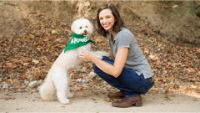 Nicole Ellis
Nicole Ellis
Nicole Ellis is a professional dog trainer with Rover.
“I recommend a number of breeds for families with kids, including…”
1. Great Pyrenees
- This breed is known as the gentle giant as they can grow to well over 100 pounds. But don’t let their size fool you; they’re great dogs for families.
- They are a guardian breed that was meant to protect a flock, so being with their family is important to them.
- Despite their size, Great Pyrenees don’t need tons of exercise. They would enjoy a large yard to roam or one to two brisk walks a day. They like consistency and knowing who their family is.
- Make sure you have plenty of time to dedicate to spending time with your Great Pyrenees. And perhaps keep a Dyson Animal Vac or plenty of lint rollers handy.
- Training is also key with this breed; Great Pyrenees also need to learn to trust their pet parent.
2. Rottweilers
- While movies often depict Rottweilers as foaming at the mouth and hyper-aggressive, the breed actually has a calm, patient, and reserved personality that is great for families.
- Rots are also very protective over their families and are strong, loving, and confident.
- As with any strong dog, training is key.
3. Labradors
- Perhaps the quintessential American family dog, Labradors are beloved family pets, and with good reason.
- Labs are good-natured dogs that can be a loyal and loving family companion for many years to come.
- Labs are often happy, smart, and social, making them perfect for any family.
4. Bulldogs
- Bulldogs are perfect for families looking for a low-maintenance dog. They want nothing more than to lay on the couch with their families and be loved by kids.
- Since they have lower energy, they are great for busy families.
- Even though this dog is just fine with minimal exercise, make sure you’re still able to give your Bulldog walks on a regular basis and regulate their food intake. You’ll also need to be aware of common health problems down the line.
5. Newfoundlands
- Known as a “babysitter” dog, the Newfie is one of the best family dogs.
- The breed is calm and eager to please, as well as wonderfully patient with kids of all ages.
- Buyer beware—these dogs shed, drool, and basically leave a big mess all over the house and furniture.
6. Cavalier King Charles Spaniels
- Hopelessly devoted to their families, the Cavalier is a trustworthy companion for kids.
- They love playing games and frolicking but also will enjoy a cuddly nap in your lap.
- Little ones will adore petting their long, silky coats—just make sure they’re gentle.
6. Bichon Frise
- Bichon pups are endlessly cheerful and also require regular exercise to burn off energy—perfect for extra-active kids.
- Just make sure your yard is securely fenced, as these lovable little cotton balls can be quite the escape artists.
7. Maltese
- They’re so tiny, typically weighing just 3 to 7 pounds!
- Despite being diminutive, they have big personalities and a gentle, loving nature that jives well with family life.
- Make sure all kids are taught how to safely hold these little guys, especially when they’re puppies.
8. Beagles
- This friendly, curious breed is known for a gentle and even temper that pairs well with children.
- Though they’ll want to spend all of their time with the family at home, don’t bank on them as a security system—they’re a little too friendly to make competent guard dogs.
9. Pembroke Welsh Corgis
- Corgis love nothing more than following their loved ones around.
- Affectionate, sweet, and wicked smart, these canines are programmed to please, so begin training them early on.
 Jonathan Rose
Jonathan Rose
Husband and wife team Jonathan and Ashton Rose launched Aurora Pets, a UK luxury retail site honoring our four-legged friends and to celebrate only the most luxury and premium brands available.
“We highly recommend the French Bulldog as the single best dog breed for anyone, not only children…”
We are absolutely Frenchie mad, and for good reason—we have never met such affectionate, playful dogs. If you are looking for a dog with character and charm, the Frenchie has them in bundles.
We love all dogs that we meet, but our two French Bulldogs have brought immeasurable love and laughter to our lives.
French Bulldogs are great with children. They are always eager to play and just as happy to sit and snuggle up. They can be quite stubborn at times, but this only adds to their character. We would suggest adopting or find a European breed French Bulldog as their noses are not pushed in as much, which is generally much healthier for them.
 Haeleigh Hyatt
Haeleigh Hyatt
Haeleigh Hyatt is the director of training at SpotOn Virtual Smart Fence, where she is responsible for recruiting and managing partner trainers. She played an instrumental role in the development and testing of the product’s three associated training programs, which provide users with step-by-step instructions for training their dog with the product.
“Though it may seem odd, Great Danes are actually great for dog owners with children…”
Great Danes are known as the gentle giants of the dog world and love to be around people. These dogs are generally very calm and even-tempered, as well as very affectionate, making them a great companion for kids.
 Shawn Hostetter
Shawn Hostetter
Shawn Hostetter is the Owner and President of Keystone Puppies, an online puppy breeder advertising agency. Shawn has helped thousands of wannabe puppy parents make their dreams a reality with the help of his breed expertise and trustworthy breeders.
“The Cockapoo is one of the best dog breeds for kids and families…”
We always recommend this mid-sized pup for families with children because they tend to be loving, obedient, gentle, easy to train, and better yet—low on shedding. While Cockapoos have plenty of energy to play outside with kids, they also love a nice, relaxing evening cuddling on the couch. Plus, who doesn’t love a curly-haired cutie?
